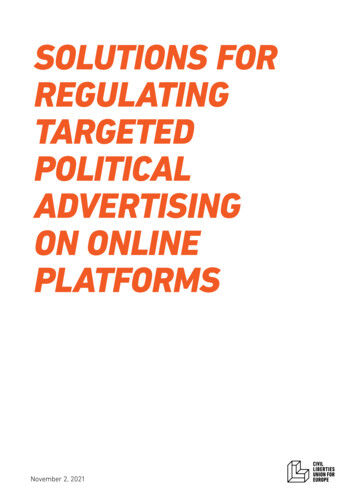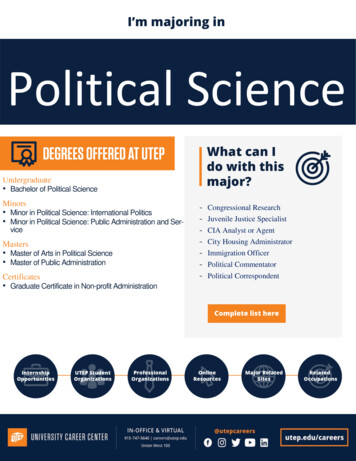
Transcription
SOLUTIONS FORREGULATINGTARGETEDPOLITICALADVERTISINGON ONLINEPLATFORMSNovember 2, 2021
Solutions for Regulating TargetedPolitical Advertising on Online PlatformsPublisherCivil Liberties Union for Europe e.VRingbahnstraße 16-18-2012099 Berlin, Germanywww.liberties.euAuthorsJascha GalaskiEva Simon
Solutions for Regulating TargetedPolitical Advertising on Online PlatformsTable of contentsIntroductionKey FindingsWhy are targeted political advertisements a threat to democracy and fundamental rights?Transparency by default and going beyondThe problem with defining online political advertisingIt is unlawful under the GDPR to target people with political messages by defaultStrong enforcement neededConclusion468911131617
Solutions for Regulating TargetedPolitical Advertising on Online PlatformsIntroductionand arguments that reinforce their own existing beliefs. Instead of enriching politicaldebate, it creates echo chambers and increasespolarization.Online targeting provides political actors, suchas government officials, political parties, paidinfluencers or local activists, new opportunities to influence people over political issues.Political advertisers can target people based onthe personal data they provide online or targetpeople based on online behavioral data collected and made available by online platforms.Political advertisers can use these data to segment groups of people susceptible to beingconvinced by a given message and send thosepeople highly personalized appeals to supporta particular candidate or policy proposal.Since the Cambridge Analytica scandal wasrevealed in 2018,1 European lawmakers havebeen actively looking for ways to preventmalign actors from compromising fair elections.2 Political advertising, whether offlineor online, is currently regulated by nationalelectoral laws and by online platforms’ terms ofservice. Facebook and Google impose certainlegal and transparency requirements on advertisers. Other online platforms, such as Twitter,3 Pinterest,4 LinkedIn5 and TikTok6 evenwent as far as banning all political advertising– although it is worth noting that politicaladvertisements were never an important sourceof revenue for these companies. However,issue-based advertisements on these platformspersist, and the key question – where do wedraw the line between political and non-political content – remains. What is worrying is thatthe laws governing elections are partially setby private companies that aren’t democraticallyaccountable to voters.Targeting techniques benefit political actors,for example by allowing them to reach disengaged citizens and those who ignore traditional mass media, which may increasepolitical participation and knowledge aboutspecific issues. But targeting can also be usedto mislead, manipulate, discriminate againstor demobilize voters. Political parties can usetargeting techniques to say different thingsto different people. This allows candidates toengage in duplicitous campaigning (promisingdifferent things to different people) and canlead to feeding citizens only with information1 Cadwalladr, C and Graham-Harrison, E. “Revealed: 50 million Facebook profiles harvested for Cambridge Analytica inmajor data breach” The Guardian, March 17, 20182 European Commission. “Report on the 2019 elections to the European Parliament” June 19, 20203 Twitter. ads-content-policies/political-content.html4 Pinterest. ines#sub-section-political-campaigning5 LinkedIn https://www.linkedin.com/legal/ads-policy#D6 Chandlee, B. “Understanding our policies around paid ads” TikTok, , October 3, 2019.4
Solutions for Regulating TargetedPolitical Advertising on Online PlatformsThe ability of political parties to deliver political messages to the public is protected by theright to freedom of expression. At the sametime, users also have a right to share their ownopinions and have access to the opinions ofother users and politicians. On the other hand,online political targeting practices may undermine citizens’ fundamental rights, includingthe protection of personal data, privacy, andthe right to a fair election, affecting the lives ofmillions of people.commercial advertising. We want to analyzetargeting from the fundamental rights perspective, namely, freedom of expression, personal data protection, and the impact on fairelections. These fundamental rights are closelyconnected to targeted political speeches, letthem be advertising or others. We want tomake sure that political actors can continuedelivering their messages on online platformswhile protecting free elections and the privacyof individuals. We limit ourselves to examining advertising on online platforms.The European Commission has already underlined in the European Democracy ActionPlan the need to ensure greater transparencyin political advertising and plans to present aproposal in the third quarter of 2021 to mitigate the damaging impact of targeted politicaladvertising. The ongoing legislative procedureof the Digital Services Act (DSA) will alsoregulate political advertising to a certain extent.We believe that besides existing General DataProtection Regulation (GDPR) rules, newregulations should limit the existing practice of targeted political advertising throughenforceable transparency rules, limitation ontargeting, and creating proper enforcement.There are solutions that are fundamentalrights-friendly and still allow political partiesto deliver their messages to the general public.In addition, transparency requirements, theneed for strong enforcement, and the applicable GDPR rules offer solutions horizontally toonline targeting.We call targeting methods targeting in general,let that be micro- or nanotargeting. We believethat general rules, especially data protectionrules, should be applied and further specifiedto protect the fundamental rights of the usersand healthy public debate where participantscan freely express themselves, which in turnallows the users to make informed decisionsabout politics.This paper analyzes what measures Europeanand national lawmakers, and European andnational authorities, should take to regulate targeted political advertising. This paperfocuses on political advertising on onlineplatforms.7 We intentionally avoid covering7 You can read about our findings for online advertising in the AdTech industry here: Simon, E. June 4, 2019. -us-fix-ad-tech-campaign/275 Reich, O. “New Privacy ComplaintsFiled In Against Invasive Online Advertising” Civil Liberties Union for Europe. December 10, 2020.5
Solutions for Regulating TargetedPolitical Advertising on Online PlatformsKey Findingsother remuneration received to displayadvertisement.Liberties advocates the following solutionsconcerning targeted political messages:These are the first steps that would allowindependent researchers, relevant authorities,national electoral commissions, other publicauthorities, and regulatory bodies to monitorpolitical advertising and better understand itsimpact on democracy and fundamental rights.1. Greater transparency from online platforms. Online platforms should be subject tostrict transparency obligations. In particular,there should be:2. More financial transparency from politicaladvertisers. Besides online platforms, politicaladvertisers should also be subject to strictertransparency requirements. They should publish a report at least once a year that providesinsights into their online advertising activity,including information on the performanceof their advertisements, the targeting criteriaused, the money spent, and the intended purpose. These transparency measures are criticalin countries like Hungary, where the government excluded online political advertisementfrom political advertising rules and from campaign spending. Journalists and citizens canonly rely on Google’s and Facebook’s transparency databases. Mandatory disclaimers on all political andissue-based advertisements. The disclaimers should include detailed informationon why, how, and by whom advertisementrecipients are targeted. Most importantly,recipients should be informed that themessage is a paid political advertisement. Mandatory advertisement archives withdetailed information on all political andissue-based advertisements. It shouldcontain, among other things, the advertisement’s content, the targeting criteriaused to reach out to online platform users,the amount spent, the time it started andthe time it stopped and the performanceof the advertisement. The archive must bepublicly available, easy to navigate, anddesigned to facilitate research and analysis.3. Enforce the GDPR. The European Commission and national Data Protection Authorities (DPAs) must properly enforce the GDPR.The GDPR has the potential to safeguard EUresidents’ rights and prevent the misuse of theirpersonal data for targeting purposes. It caneliminate dark patterns that online platformsuse to trick users into sharing their data, suchas “I agree” buttons that users click to get ridof annoying pop-ups or banners. Consent ofthe data subject is needed prior to processingpersonal data for targeted advertising. Even A mechanism where online platformsmust answer users’ (data subject) requestsabout their targeting methods, the dataprocessed, and the rights set out in Article15 of the GDPR. Online platforms shouldhave 15 days to answer such requests. public access to information related todirect and indirect payments or any6
Solutions for Regulating TargetedPolitical Advertising on Online Platformsorder binding remedial action. This includesissuing fines to online platforms and politicalparties or interest groups and referral of theDPAs’ and DSCs’ findings to national electoral commissions. Joint liability of platformsand political parties could force them to followthe rules.though the GDPR provides solid groundfor valid consent requirements, the lack ofenforcement creates a reference in new piecesof legislation, such as the Digital Services Act(DSA) and the relevant upcoming proposal fortargeted political advertising. Proper enforcement of the GDPR and further rules wouldcorrect the current power imbalance betweenonline platforms and users.6. Empower users. There is a severe powerimbalance between online platforms and users.Users should have more control over theirnews feed and their personal data online. Theyshould be allowed to decide whether they wantto receive targeted political advertisements ornot. For this to happen, and in accordance withEU data protection rules, online platformsshould receive users’ explicit consent via anopt-in. To limit pop-up fatigue, there shouldbe rules that limit how often online platformscan ask users to opt-in.4. Strengthen data protection rules throughDSA and ePrivacy Regulation. The Commission and national DPAs should elaborateguidance to clarify how the GDPR should beapplied to political advertising. It is obvious bynow that more detailed data protection rulesare needed to establish a robust and universal application of privacy-friendly advertisingmethods. The draft ePrivacy regulation or thedraft Digital Services Act offers the possibilityfor European legislators to fine-tune GDPRrules in this field. In addition, the Commission should urge the Member States to provideDPAs with the funds necessary for the tasksthey are expected to undertake and exploreways of supporting DPAs directly, for exampleby providing them with expertise and services.7. Limit targeting methods to the minimum.Regulators should limit the targeting methodsthat online platforms make available to politicaladvertisers. Targeted political advertisementsbased on observed (e.g. what sort of contentusers like and share) and inferred data (assumptions that algorithms make about users’ preferences based on their online activity) should befully prohibited. The only form of personalizedtargeting allowed should be based on relevantbroad demographic data provided by users andare proven to be necessary to promote greaterdemocratic engagement by citizens, such asdata shared voluntarily about broad locationdata, age, and language preferences or for usingopt-in mechanisms. Here too it is only legitimate if the data subject consents to use thesedata sets for targeting. This limitation on the5. Conduct Data Protection Impact Assessments and Human Rights Impact Assessments. In fulfilling their transparency obligations, political parties, interest groups, andplatforms should be required to conduct andpublish Data Protection Impact Assessmentsand Human Rights Impact Assessment relating to online political campaigns hosted onrelevant platforms. National DPAs, DigitalServices Coordinators (DSCs), and the electorate bodies should have the authority to7
Solutions for Regulating TargetedPolitical Advertising on Online Platformswho would then face heightened scrutiny andpossibly volume or spending caps, is also anapproach worth considering.choice of targeting criteria would reduce thepossibility that political actors tailor differentpromises to different homogenous groups ofpeople and manipulate the electorate. Instead,we believe that non-surveillance methods suchas contextual advertising offer the best wayforward.Why are targeted politicaladvertisements a threatto democracy andfundamental rights?8. Strong enforcement of new rules. Regulation of targeted political advertising is essentialto healthy democratic debate and fair electionsacross the EU. As we have seen concerningthe GDPR, the key is how rules are enforced.We learned the lesson that self-regulation andvoluntarily applied transparency rules are notenough. We believe that regulatory oversightis a must. Data Protection Authorities, Digital Services Coordinators, electoral authorities, and independent auditors are critical increating meaningful mechanisms. We needa European-level, cross-sector authority forproper oversight. One solution is the EuropeanDigital Services Coordinators Board, similarto the European Data Protection Board.Targeted political messaging practices poseseveral threats to democracy. Foremost amongthese is polarization. In a well-functioningdemocracy, citizens are confronted with pointsof view that differ from their own. As a result,they get the chance to participate in a balanceddebate and consider different perspectives.However, targeted advertising exposes citizensrepeatedly to opinions similar to their own, thusreinforcing their own beliefs. Sealing peoplein such ideological echo chambers limits theirright to information and leads to polarization.This in turn makes it difficult for the democratic process to deliver compromises that canmake citizens across the political spectrumfeel heard. Instead, it makes ‘winner-take-all’politics more likely, which can alienate largenumbers of voters.9. Cautiously define political advertising andadvertisers. To regulate political advertising,we need a definition. To avoid over-regulationand limitation of public discourse, we advocatefor a narrow definition. However, we firmlybelieve that the solution limiting targetedpolitical advertising is to minimize the data setand require the consent of the users. In thisway, the targeting method would not dependon the classification of the advertisement butrather the data minimization and the consentapproach that could effectively limit the practice of targeting. We also believe that definingcertain primary and secondary advertisers,Targeting campaigns also allow the sameactor to provide different categories of voterswith plainly contradictory messages whileconcealing this duplicity. Instead of presenting a consistent agenda to the general public,political actors can send tailored messages tohomogenous groups promising to focus on theissue that is the most salient for them. These8
Solutions for Regulating TargetedPolitical Advertising on Online Platformsgroups would then have a biased perception ofthe political actor’s priorities.of any regulation. Individuals exposed to political advertisements should know exactly why,how, and by whom they are being targeted.When individuals are made aware of why theyare receiving specific messages, they are morelikely to evaluate them critically. However,while empowering users is one tool, it is farfrom enough. Offering transparency for usersmeans placing a burden on them to navigatea broken system, and many people don’t havethe time or inclination to do this. We shouldnot expect people to report systemic problemsof the online ecosystem.Malign actors can further exploit these bubblesfor disinformation campaigns and to suppressvoters.8 For example, during the 2016 US elections, black Americans, who generally favorDemocrats over Republicans, were spammedwith messages attacking Hillary Clinton inorder to discourage them from voting.Finally, targeting can be used to discriminateagainst and exclude certain groups from receiving information, which can increase marginalization and social exclusion. For example,advertisements about employment, housing, orelections can be hidden from certain people,based on age, gender, location, or more sensitive data, like ethnicity, political and sexualorientation, or browsing behavior. This wasdemonstrated in a study by investigative journalists who published housing advertisementsand, using Facebook’s targeting tools, excludedcertain groups, such as Black Americans, Jews,mothers of high school kids, or people interested in wheelchair ramps.9On the other hand, more transparency willhelp authorities and lawmakers to understandbetter the impact of political targeting andtake appropriate measures. Regulators will beable to identify patterns, such as large amountsof funding from particular sources, linksbetween organizations and political partiesor concerted efforts to mislead public opinion. This information will allow regulators toadapt electoral rules, for example by expandingcampaign finance rules to include spending onsocial media. It will also give regulators moreinsights to understand whether there is a needfor further rules to protect public debate. Moretransparency will also facilitate the work ofjournalists and researchers to signal attemptsby political advertisers to mislead, manipulateor demobilize voters. This additional scrutinyby journalists and researchers is crucial, asTransparency by defaultand going beyondIncreased transparency is part of the solution tocountering the damaging impacts of politicaltargeting and must be one of the basic principles8 ubramanian, S. “Inside the Macedonian Fake-News Complex” Wired, February 2, 2017.9 Angwin, J. et al “Facebook (Still) Letting Housing Advertisers Exclude Users by Race” ProPublica, November 21,2017.9
Solutions for Regulating TargetedPolitical Advertising on Online Platformsregulators may be subject to political pressureand limited resources.the most common attribute, and not because oftheir interest in “pregnancy”.In response to regulators’ concerns, digitalplatforms have recently started to offer sometransparency mechanisms. Google and Facebook, for example, have labeled political advertisements and issue-based advertisements,respectively. When Facebook users click onan advertisement related to a social issue (e.g.elections or immigration), they have access tosome limited information, including the sponsor’s identity. A “why am I seeing this?” buttonreveals basic information on the targeting criteria, and users have the option to click to seefewer advertisements about certain issues inthe future. These are important mechanisms,as they allow users to get a better understanding of and some control over their news feed.However, they are still rudimentary. The information accessible to users is extremely limitedand can give a false sense of understanding.For example, the “why am I seeing this?” feature from Facebook only reveals one parameterto users, while advertisers usually choose multiple criteria. Researchers have also found thatFacebook’s explanations are often misleading.10 During the 2019 European elections,pregnant women in Poland were targeted withmessages on prenatal screenings and perinatalcare; if they clicked on “why am I seeing this?”they would only be informed that they weretargeted because of their interest in “medicine”,Further important transparency tools areadvertisement archives. Both Google andFacebook have created online repositories.Google’s archive contains political advertisements, whereas Facebook’s archive containsadvertisements related to social issues. However, these archives have serious shortcomings.First, they are extremely hard to navigateand lack important information, such as theexact targeting criteria or advertisement performance. Second, studies11 have shown thatsome political advertisements are missing inthe archives while some commercial advertisements are erroneously included. This makes itharder for researchers and journalists to get aproper understanding, impeding public scrutiny and accountability.A proper advertisement archive should providea comprehensive overview of all political andissue-based advertisements. It should contain1) the content (i.e. the text, image and/orvideo content), 2) detail the targeting criteriaused to reach out to online platform users, 3)the amount spent and the performance of theadvertisement. The archive must be 4) publiclyavailable, 5) easy to navigate and instead ofrestricting and putting constraints, it should6) facilitate research and analysis. Libertiesendorses the recommendations by the MozillaFoundation and a group of independent10 Iwańska, K. et al. “Who (really) targets you?”. Panoptykon Foundation https://panoptykon.org/political-ads-report11 European Partnership for Democracy. “Universal Advertising Transparency by Default” , September 2020. EuropeanPartnership for Democracy. “Virtual Insanity? Transparency in digital advertising” March 2020 .10
Solutions for Regulating TargetedPolitical Advertising on Online Platformsresearchers on the required features of aneffective advertisement archive API (Application Programming Interface),12 as well as thedetailed model advertisement archive developed by the organization Who Targets Me.13and eliminate unlawful targeting methods.The draft DSA Article 24 (advertising) andArticle 29 (recommender systems) require onlylimited data disclosures and focus only on targeting attributes, but not on platforms and thealgorithm they use. Regulators should focus onthe algorithm because the surveillance advertising models are hidden in the algorithm, andit conflicts with with the fundamental rightsof the users and the democratic values of theEuropean Union. Another solution is to havethese rules in a separate act, such as the rulesbased on the European Democracy ActionPlan.Aside from introducing and enforcing transparency requirements, platforms and advertisers should be obliged to carry out Data Protection Impact Assessments and Human RightsImpact Assessments.14 Analyzing the impactof political campaigns and disclosing relateddata would serve as further safeguards to better protect fundamental rights and democraticvalues.The problem withdefining online politicaladvertisingIn the draft DSA, transparency requirementsare set out for very large online platforms.Recital (63) and Article 36 will require verylarge online platforms to ensure public access toadvertisement repositories, while the Commission is obliged to encourage the developmentof codes of conduct. We are of the opinion thata code of conduct is far from enough to regulate and provide oversight of such activities.The DSA offers a great opportunity to limittargeted political advertising to a minimum,while also introducing detailed provisions andeffective oversight tools to enforce transparencyThere is currently no common definition ofpolitical advertising at EU level. Online platforms have created their own definitions andrules. Twitter and TikTok have banned political advertisements. Google15 has differentelection advertisement policies depending onthe region.16 In the EU, political advertisers(e.g. political parties) must first be verified by12 Mozilla. “Facebook and Google: This is What an Effective Ad Archive API Looks Like” March 28, 201913 Who Targets Me. -a-technical-proposal/ December 18,2020.14 See EDPB Guidelines on Data Protection Impact Assessment (DPIA) and determining whether processing is“likely to result in a high risk” for the purposes of Regulation 2016/679, ltation/edpb guidelines 202008 onthetargetingofsocialmediausers en.pdf, Adopted on 4 April 2017.Google Advertising Policies. 16 Google Advertising Policies.11
Solutions for Regulating TargetedPolitical Advertising on Online PlatformsGoogle and the targeting criteria they can useare limited to geographic location, age, genderand contextual targeting options. Facebookuses a definition of issue-based advertisements.This means that Facebook effectively designates advertisements as ‘political’ dependingnot on whether they are directly connectedto a particular political campaign but ratherbased on whether they concern topics that arepolitically sensitive.17 These issue-based advertisements are subject to increased transparencyobligations. For example, political advertisersin the EU who want to launch an advertisement on ‘civil and social rights’ on Facebookare required, among other things, to use ‘Paidfor by’ disclaimers. However, these definitionsare often inconsistent with the requirementsset out in the laws of EU Member States wherethey exist.18 Also, it sheds light on the problemthat unaccountable companies motivated byprofit rather than the desire to support democracy effectively make the rules about what people can say to whom during elections.for political advertisers to bypass legal limitations. Whether political advertising is definedbroadly or narrowly, the definition is still likelyto create some legal uncertainty. There is,however, one major advantage in agreeing ona common definition of political advertising: itfacilitates oversight and enforcement.Another possibility is instead of providing anall-encompassing, content-based definition,regulators, online platforms, civil societyactors and other stakeholders could also agreeon defining certain actors as primary politicaladvertisers (e.g. political parties, political foundations, interest groups) and secondary advertisers (those who advertise on their behalf).20These actors would face heightened scrutinies,such as reporting obligations or possibly volume or spending caps. However, some actors,like civil society or influencers, who can alsopay to deliver political messages and potentially influence citizens’ voting behavior, wouldnot be covered in this definition.Defining ‘political advertising’ is a complexissue that raises many questions.19 On theone hand, defining ‘political advertising’ toobroadly may seriously limit the right to freedom of expression and freedom of informationby imposing rules on content that is not political advertising. On the other hand, an overlynarrow definition would leave too much scope17Facebook18 European Regulators Group for Audiovisual Media Services. “Report of the activities carried out to assist the EuropeanCommission in the intermediate monitoring of the Code of practice on disinformation”, June 2019.19 Jaursch, J. “Defining Online Political Advertising” Stiftung Neue Verantwortung, November 24, 2020.20 See Footnote 19.12
Solutions for Regulating TargetedPolitical Advertising on Online PlatformsIt is unlawful under theGDPR to target peoplewith political messagesby defaulteither with the consent of the user, or for thepurposes of a legitimate interest.22Liberties is of the opinion that legitimateinterest (GDPR Art 6 (1) (f)) does not constitute a legal basis for targeting the usersof online platforms with political messagesbecause online platforms’ economic or politicalinterests should not be considered as legitimateinterests. Therefore, anyone who targets usersshould have the users’ prior consent (GDPRArticle 6 (1) (a)).23The GDPR only allows the use of limited targeting methods and requires the user’s consentfor being targeted. We believe that the limitation on targeted advertisement could have beenintroduced by applying the GDPR properly.The lack of enforcement creates an environment where further guidance, clarifications,and limitations are needed both for politicalparties and platforms to apply data protectionrules.Online platforms whose business modelis based on data harvesting must meet therequirements of the GDPR and require userconsent to use their personal data for targetingpurposes. This means that anyone who wishesto get tailored messages based on provideddata should opt-in for this ‘service’ voluntarily, based on an informed decision. This ruleis currently circumvented by online platforms,Here we argue that even the GDPR servesas solid ground for limiting targeted politicaladvertisements. In the GDPR, there are twolegal bases to process personal data of onlineplatform users in the targeting processes:2121 Data subject’s consent (Article 6(1)(a) GDPR) or legitimate interests (Article 6(1)(f) GDPR).22 For detailed analysis see Guidelines 8/2020 on the targeting of social media users Version 1.0, adopted on 2September 2020. However, we call attention to the significant difference between targeting political and non-polit-ical messages. While we can have a well-established argument that sanitary products are only targeted for a certainage group, we cannot argue the same for political advertisements.23 The Judgment in Fashion ID, 29 July 2019, C-40/17, para. 95 - ECLI:EU:C:2019:629, CJEU reiterated that inorder for a processing to rely on the legitimate interest, three cumulative conditions should be met,
in political advertising and plans to present a proposal in the third quarter of 2021 to miti-gate the damaging impact of targeted political advertising. The ongoing legislative procedure of the Digital Services Act (DSA) will also regulate political advertising to a certain extent. We believe that besides existing General Data










